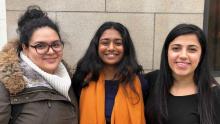By Medha Raman | LSJ Communications Assistant
Many Law, Societies, and Justice students are drawn to the major because of their interest in public service. The UW School of Law appears to be taking notice.
In an effort to promote social justice and equity, the UW Law School each year provides full tuition support to five public interest-minded students through it Gates Public Service Law Scholarship Program. It is a highly competitive honor.
In the past five years, fully 20 percent of the Gates Scholars have been LSJ alumni.
Three of them are current law students. Ester Garcia graduated from LSJ in 2010, while Dashni Amin Varsha Govindaraju, both graduated in 2015. All of them credit LSJ for driving their interest in public service law.
All three knew from a young age that they were passionate about public service. Govindaraju’s childhood experiences within her own low-income, immigrant community in Federal Way inspired her passion for challenging dominant institutions and narratives. Garcia’s experience as a child of migrant farmworkers similarly fueled her understanding and interest in dismantling systems of power and privilege. For Amin, growing up as a child of Kurdish refugee parents who lived in public housing, a sense of community was always key.
“It would be so easy for me to gently close that door of where I came from, and now be a corporate lawyer and just forget,” Amin said. “Because it is really hard to choose to continue to be in these sites of pain and to really stand by your community. It’s not easy, it’s not glamorous, it’s not prestigious. But it feels good, because it feels a lot truer to do this for my community.”
Upon entering UW as undergraduates, many of the scholars were looking for a major that matched their interests and values. LSJ was just the right fit.
“LSJ showed me an applicable and innovative take on the law,” Govindaraju said. “It cemented my interests and gave me the tools to understand it.”
Within LSJ, each scholar had numerous meaningful experiences that shaped their time in the major and led them on their current paths. In Professor Arzoo Osanloo’s seminar on Women in Islamic Law, Amin was able to challenge her own internalized Islamophobia and learn about the countless Muslim women on the frontlines of feminist movements.
“Through this class, I got to see myself more fully,” Amin said. “I saw that I could be a strong woman and still have a Muslim identity.”
Working at Columbia Legal Services for LSJ 401 was similarly eye-opening for Govindaraju. At CLS, she was able to see lawyers with backgrounds in community organizing do work in the legal field without compromising their values. And in LSJ, Govindaraju was also able to find lifelong guides.
“My professors in LSJ have just been such great mentors,” Govindaraju said. “They always remember you, they’re always there for you, and they always say hi when they see you. I don’t think I could’ve found that in any other major.
After graduation, each scholar took time off to find their own path to law school. As a Luce Scholar, Govindaraju traveled to Cambodia, where she worked on domestic violence and human trafficking prevention with a local NGO. Amin traveled through numerous Muslim majority countries as a Bonderman fellow, studying Muslim women in action in an effort to challenge dominant narratives.
Garcia advocated for immigrant rights, eventually working as an accredited representative at the Northwest Immigrant Rights Project leading a partnership with Tacoma Community House. When she realized that she didn’t have the foundational legal knowledge to make the necessary technical arguments on behalf of her clients, Garcia decided it was time to pursue law school.
In law school, each scholar has to contend with a highly competitive and sometimes hostile-seeming environment, one that thrives on prestige, power, and reputation. Their saving grace has been the Gates Scholars, who offer a community of like-minded individuals willing to stand up for their values.
“I’ve always had to navigate the educational space on my own, even in elementary school,” Garcia said. “So being part of the Gates program has been amazing in that it’s provided me a built-in community of like-minded people. They might not necessarily have the same legal interests as me but they all have the same end goal of making law and justice more accessible.”
The future plans of LSJ’s Gates scholars clearly reflect this end goal. Govindaraju hopes to work in criminal public defense after graduation, specifically focusing on low-income individuals, people of color, and immigrants, who are often targets of the criminal justice system. Given her own background, this issue is close to home.
“Law needs more people who come from community work and people who have experiences living through any kind of hardship or adversity,” Govindaraju said. “Because the only way you’re going to understand who needs help is if you have needed help before or if you know what it’s like to be in a situation where your agency is compromised. And as much as we all struggle with it, at the end of the day that’s why we’re all here.”
